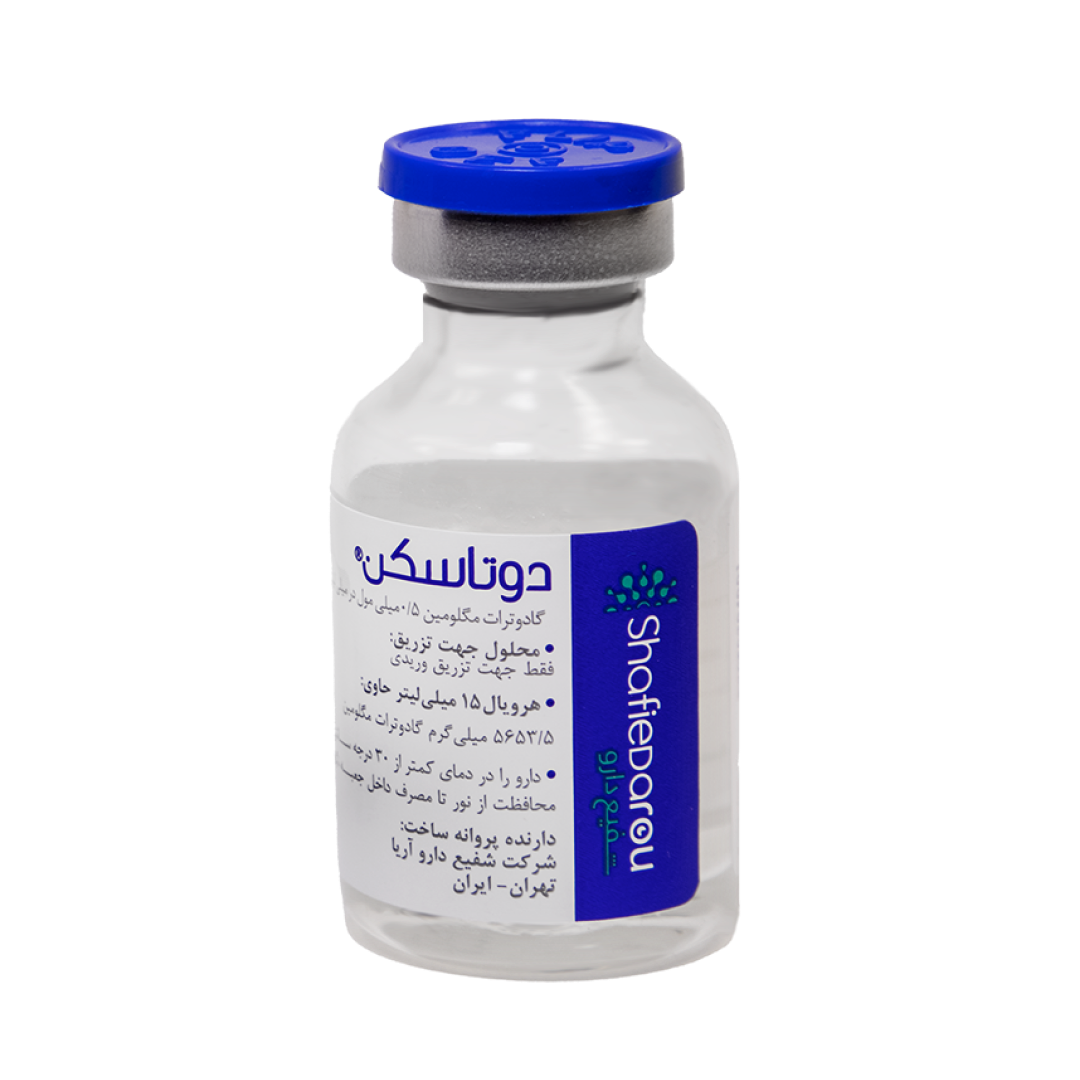
Advanced Imaging for Precision Diagnosis
DotaScan® is your trusted partner in advanced medical imaging, offering unparalleled clarity and precision for MRI scans. Designed to enhance the visibility of normal and pathological tissues, DotaScan® ensures accurate and reliable diagnosis for both healthcare professionals and patients.
About DotaScan
DotaScan® is a gadolinium-based contrast agent designed for intravenous diagnostic use during MRI investigations. It helps to detect and visualize areas with disruption of the blood-brain barrier and/or abnormal vascularity.
Significantly improves the visibility and clarity of MRI scans, enabling healthcare professionals to detect and diagnose conditions with greater precision.
Helps identify difficult-to-detect lesions and abnormalities by enhancing the contrast between normal and abnormal tissues.
Optimized pharmacokinetics for shorter, more comfortable scans enabling more efficient workflows and improved patient comfort.
Why Choose DotaScan?
Cost-Effective
Offers the same quality and effectiveness as its competitors but at a lower cost.
Safe
Low risk of Nephrogenic Systemic Fibrosis (NSF), prioritizing patient safety.
Trusted
Trusted by healthcare professionals and backed by extensive research.
Compatible
Has a favorable safety profile, making it suitable for a wide range of patients, including those with renal impairment.
The Science Behind DotaScan
DotaScan® is built on advanced scientific principles that enhance MRI imaging, providing healthcare professionals with exceptional diagnostic clarity. This section delves into the technical details and unique features that make DotaScan® a superior choice in medical imaging.
To enhance the inherent contrast between tissue, magnetic resonance imaging (MRI) contrast must alter rate of relaxation of the proton within tissue. Relaxation must be vary for different tissues in order to produce differential enhancement of signal.
MRI contrast agent must exert a large magnetic field density (a property imparted by their unpaired electron) to interact with the magnetic moment of proton in the tissue and shorten their relaxation time.
Most agents work through shortening the T1 relaxation time of protons located nearby. T1 shortens with an increase in rate of stimulated emission from high energy states (spin anti-aligned with the main field) to low energy states (spin aligned).
Gadolinium-Based Contrast Agents (GBCAs)
Agents with unpaired electron pair spins used as MRI contrast agent. Gadolinium (Gd3+) is an ideal proton relaxation candidate and the most widely used metal for such purposes. In its ionic trivalent form gadolinium has seven unpaired electrons leading to a large inherent magnetic moment. At temperatures above 20 °C Gd is paramagnetic. Its electronic configuration confers a long spin relaxation time to its compounds.
GBCAs have been approved for parenteral use since the late 1980s. These agents can be differentiated on the basis of chelate chemistry, stability, viscosity, osmolality, and, in some cases, effectiveness for specific applications. GBCAs are extremely well tolerated by the vast majority of patients in whom they are injected. Acute adverse reactions are encountered with a lower frequency than is observed after administration of iodinated contrast Agents.
In MRI, visualization of normal and pathological tissue depends in part on variations in the radiofrequency signal intensity that occurs with:
1) differences in proton density
2) differences of the spin-lattice or longitudinal relaxation times (T1)
3) differences in the spin-spin or transverse relaxation time (T2)
What is Gadoterate Meglumine?
Gadoterate is a paramagnetic molecule that develops a magnetic moment when placed in a magnetic field. The magnetic moment enhances the relaxation rates of water protons in its vicinity, leading to an increase in signal intensity (brightness) of tissues. When placed in a magnetic field, gadoterate shortens the T1 and T2 relaxation times in target tissues. At recommended doses, the effect is observed with greatest sensitivity in the T1-weighted sequences. Gadoterate Meglumine is an intravenous contrast agent used in MRI procedures. It belongs to the group of gadolinium-based contrast agents (GBCAs) and is renowned for its exceptional safety profile and high-quality imaging capabilities.
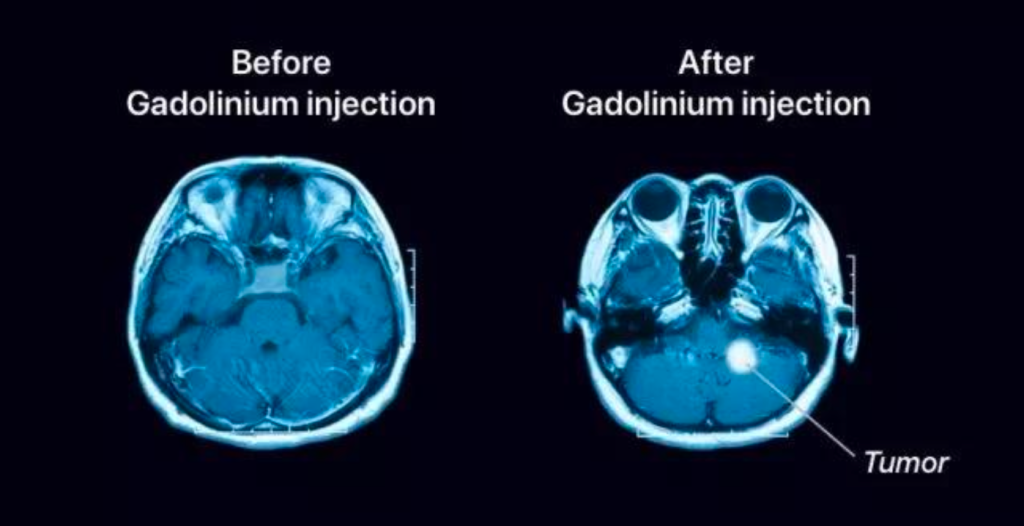
DOTA:
Free Gd (Gd3+) is very toxic and must be administered in its stable form to prevent the release of the metal ion in vivo. Chelates surround an ion and make a cage around it. A chelate of gadolinium occupies all available space around the ion except water molecule Water molecules exchange in and out of that one spot. When in that spot, the spins have an extremely short T1.
Tetraxetan or DOTA, which stands for 1,4,7,10-tetraazacyclododecane-1,4,7,10-tetraacetic acid, is a common abbreviation for a substance known as a chelating agent. Chelating agents are compounds that have the ability to form stable complexes with metal ions by enclosing them in a ring-like structure. DOTA is a macrocyclic chelating agent, meaning it forms a cyclic structure with a central cavity that can encapsulate metal ions. It is known for its high stability and strong binding affinity for certain metal ions, particularly those from the lanthanide series, such as gadolinium.
DOTA and its derivatives are widely used in various applications, including medical imaging, drug delivery systems, and industrial processes. In medical imaging, DOTA is often used as a ligand to complex with metal ions, such as gadolinium, to create contrast agents for MRI. These contrast agents help enhance the visibility of tissues and blood vessels, allowing for clearer imaging and improved diagnostic accuracy.
The stability and biocompatibility of DOTA make it an ideal choice for designing contrast agents that can be safely administered to patients. Additionally, DOTA-based chelators can be modified by attaching specific functional groups to tailor their properties for different applications.
Overall, DOTA is a crucial component in the development of contrast agents used in medical imaging, thanks to its ability to form stable and biocompatible complexes with metal ions.
Gadoterate meglumine has a cage-like structure that encases the Gd3+ion. As suggested by in vitro data, combining a macrocyclic structure for high kinetic stability, with ionicity for the thermodynamic stability, may help reduce the potential risk of gadolinium dissociation.
- Role: DOTA (1,4,7,10-tetraazacyclododecane-1,4,7,10-tetraacetic acid) is a chelating agent that forms a stable complex with gadolinium, preventing the release of toxic Gd3+ ions in the body.
- Benefits: The stability and biocompatibility of DOTA make it ideal for use in contrast agents, ensuring patient safety and effective imaging.
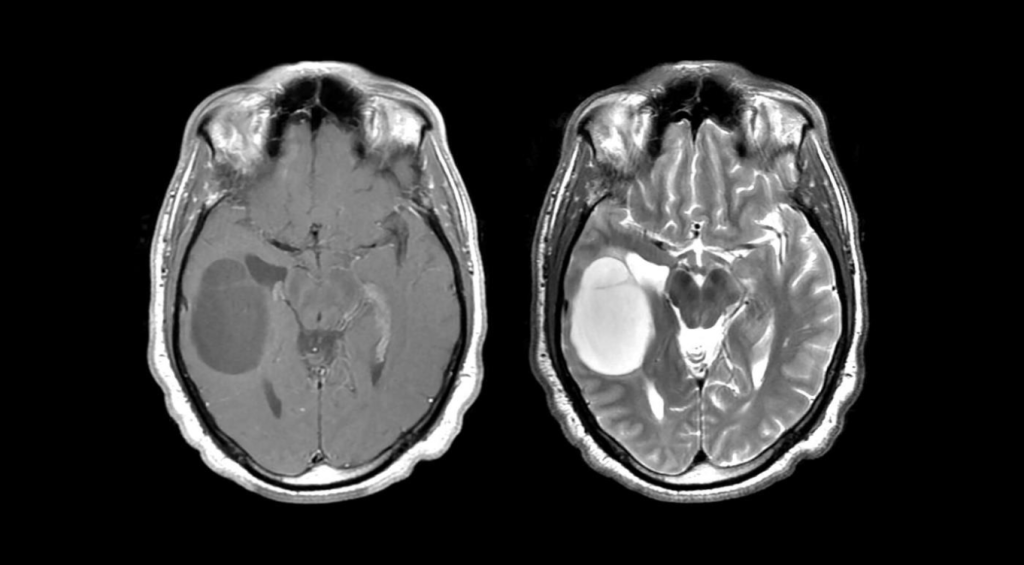
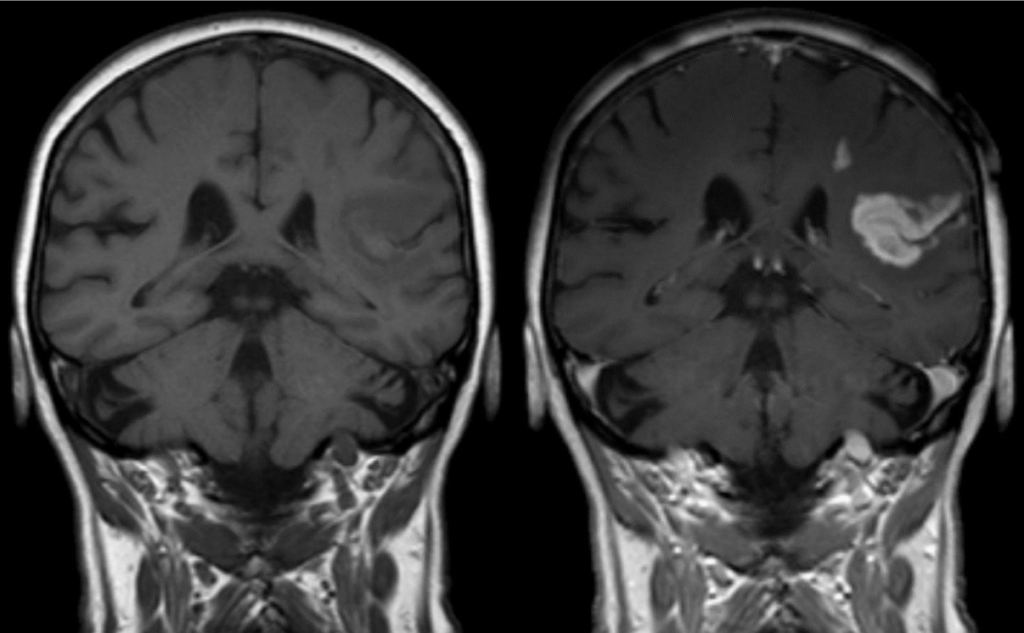
Our API (Active Pharmaceutical Ingredient) Production
An API is the primary active component in a pharmaceutical drug that produces the desired therapeutic effect. It is the specific chemical or biological substance responsible for the pharmacological activity of a drug. Shafie Darou procured gadolinium from the most reliable mineral sources in the world and after confirming the purity of 99.999%, it was used in the gadoterate meglumine production.
indicated for IV use with MRI in brain, spine and associated tissues in adult and pediatric patients to detect and visualize areas with disruption of the blood brain barrier and/or abnormal vascularity.
Dotascan® Injection is a sterile, nonpyrogenic, clear, colorless to yellow, aqueous solution of 0.5 mmol/mL of gadoterate meglumine. No preservative is added. Each mL of Dotascan® contains 376.9 mg of gadoterate meglumine, 0.25 mg of DOTA and water for injection.
Dotascan® has a pH of 6.5 to 8.0.
The main physiochemical properties of Dotascan® is provided on this table:
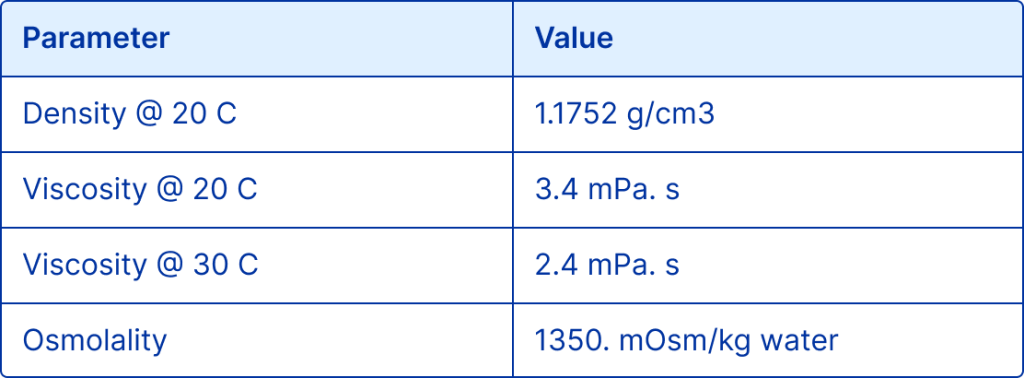
DotaScan® vs. Dotarem®
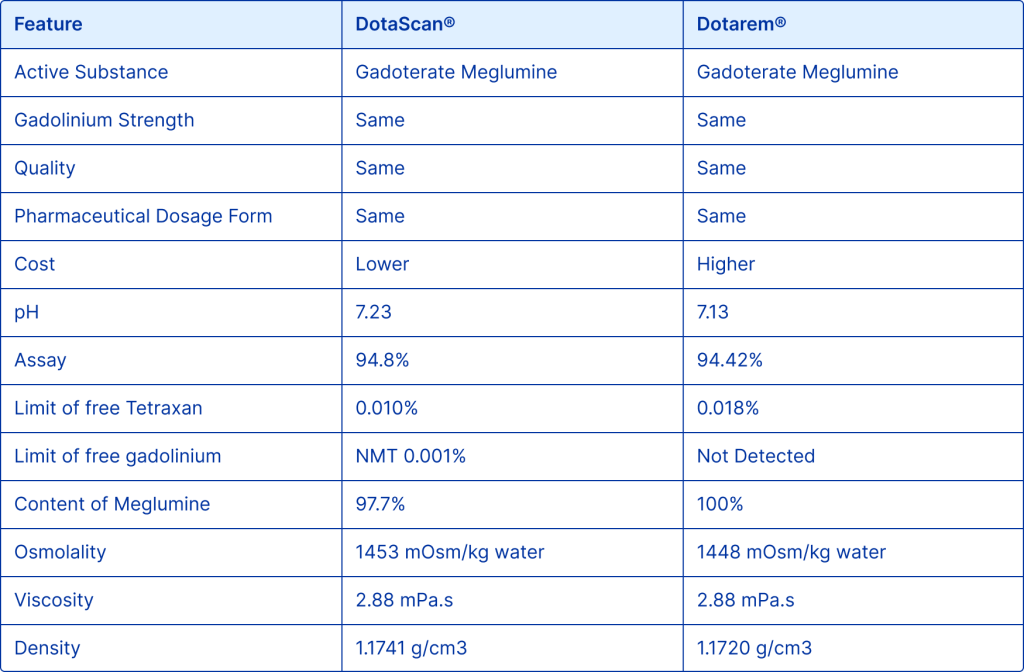
- Active Substance: Both DotaScan® and Dotarem® contain the same active ingredient, Gadoterate Meglumine.
- Gadolinium Strength: Both products provide the same strength of gadolinium, ensuring consistent imaging quality.
- Quality: The quality of imaging provided by both products is equivalent.
- Pharmaceutical Dosage Form: Both are available in the same dosage form, making them interchangeable.
Cost: DotaScan® offers a cost-effective alternative to Dotarem®, providing the same benefits at a lower price.
Safety Information
DotaScan® (Gadoterate Meglumine) is designed with patient safety as a top priority. This section provides essential safety information, highlighting the product’s low incidence of adverse reactions and its suitability for a wide range of patients, including those with renal impairment.
Low Incidence of Adverse Reactions
"DotaScan® is well-tolerated with a low incidence of adverse reactions. Most patients experience no significant side effects, making it a reliable and safe choice for MRI contrast enhancement."
Nephrogenic Systemic Fibrosis (NSF)
"DotaScan® has a substantially lower risk of NSF compared to other gadolinium-based contrast agents. NSF is a rare but serious condition associated with some MRI contrast agents, and DotaScan®'s macrocyclic structure enhances its safety profile."
Patient Tolerance
"Suitable for a wide range of patients, including those with renal impairment, DotaScan® is formulated to be safely administered, ensuring that even patients with pre-existing conditions can benefit from its diagnostic accuracy."
Important Safety Guidelines
"Before administering DotaScan®, healthcare professionals should review the patient’s medical history and current medications to prevent potential interactions. Adhere to all recommended guidelines to maximize patient safety."
Clinical Research and Approval
"DotaScan® is backed by extensive clinical research and has received regulatory approvals worldwide, underscoring its safety and efficacy in enhancing MRI scans."
Administration Precautions
"Ensure proper intravenous administration to avoid extravasation. Monitor patients for any immediate hypersensitivity reactions post-injection."
Indications for Use
DotaScan® (Gadoterate Meglumine) is used in various medical fields and imaging procedures, including:

About ShafieDarou
DotaScan® is a prime example of ShadieDarou’s innovation and quality in medical imaging solutions. As experts in the field, ShadieDarou continually strives to enhance patient outcomes through advanced technologies and high standards. For more products and information, visit the ShadieDarou website.






